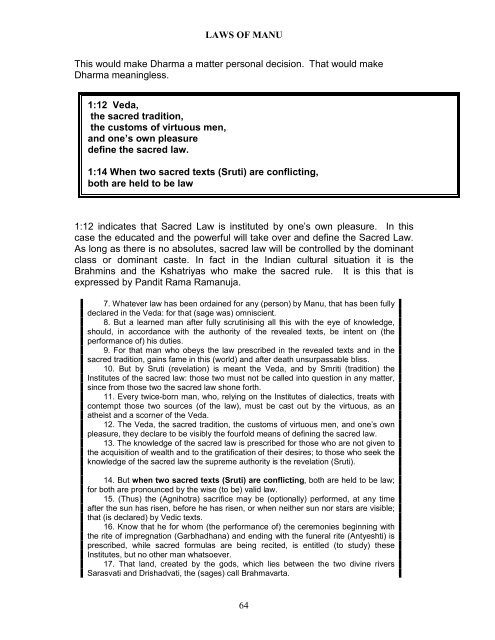You also want an ePaper? Increase the reach of your titles
YUMPU automatically turns print PDFs into web optimized ePapers that Google loves.
LAWS OF MANU<br />
This would make Dharma a matter personal decision. That would make<br />
Dharma meaningless.<br />
1:12 Veda,<br />
the sacred tradition,<br />
the customs of virtuous men,<br />
and one’s own pleasure<br />
define the sacred law.<br />
1:14 When two sacred texts (Sruti) are conflicting,<br />
both are held to be law<br />
1:12 indicates that Sacred Law is instituted by one’s own pleasure. In this<br />
case the educated and the powerful will take over and define the Sacred Law.<br />
As long as there is no absolutes, sacred law will be controlled by the dominant<br />
class or dominant caste. In fact in the Indian cultural situation it is the<br />
Brahmins and the Kshatriyas who make the sacred rule. It is this that is<br />
expressed by Pandit Rama Ramanuja.<br />
7. Whatever law has been ordained for any (person) by Manu, that has been fully<br />
declared in the Veda: for that (sage was) omniscient.<br />
8. But a learned man after fully scrutinising all this with the eye of knowledge,<br />
should, in accordance with the authority of the revealed texts, be intent on (the<br />
performance of) his duties.<br />
9. For that man who obeys the law prescribed in the revealed texts and in the<br />
sacred tradition, gains fame in this (world) and after death unsurpassable bliss.<br />
10. But by Sruti (revelation) is meant the Veda, and by Smriti (tradition) the<br />
Institutes of the sacred law: those two must not be called into question in any matter,<br />
since from those two the sacred law shone forth.<br />
11. Every twice-born man, who, relying on the Institutes of dialectics, treats with<br />
contempt those two sources (of the law), must be cast out by the virtuous, as an<br />
atheist and a scorner of the Veda.<br />
12. The Veda, the sacred tradition, the customs of virtuous men, and one’s own<br />
pleasure, they declare to be visibly the fourfold means of defining the sacred law.<br />
13. The knowledge of the sacred law is prescribed for those who are not given to<br />
the acquisition of wealth and to the gratification of their desires; to those who seek the<br />
knowledge of the sacred law the supreme authority is the revelation (Sruti).<br />
14. But when two sacred texts (Sruti) are conflicting, both are held to be law;<br />
for both are pronounced by the wise (to be) valid law.<br />
15. (Thus) the (Agnihotra) sacrifice may be (optionally) performed, at any time<br />
after the sun has risen, before he has risen, or when neither sun nor stars are visible;<br />
that (is declared) by Vedic texts.<br />
16. Know that he for whom (the performance of) the ceremonies beginning with<br />
the rite of impregnation (Garbhadhana) and ending with the funeral rite (Antyeshti) is<br />
prescribed, while sacred formulas are being recited, is entitled (to study) these<br />
Institutes, but no other man whatsoever.<br />
17. That land, created by the gods, which lies between the two divine rivers<br />
Sarasvati and Drishadvati, the (sages) call Brahmavarta.<br />
64


















